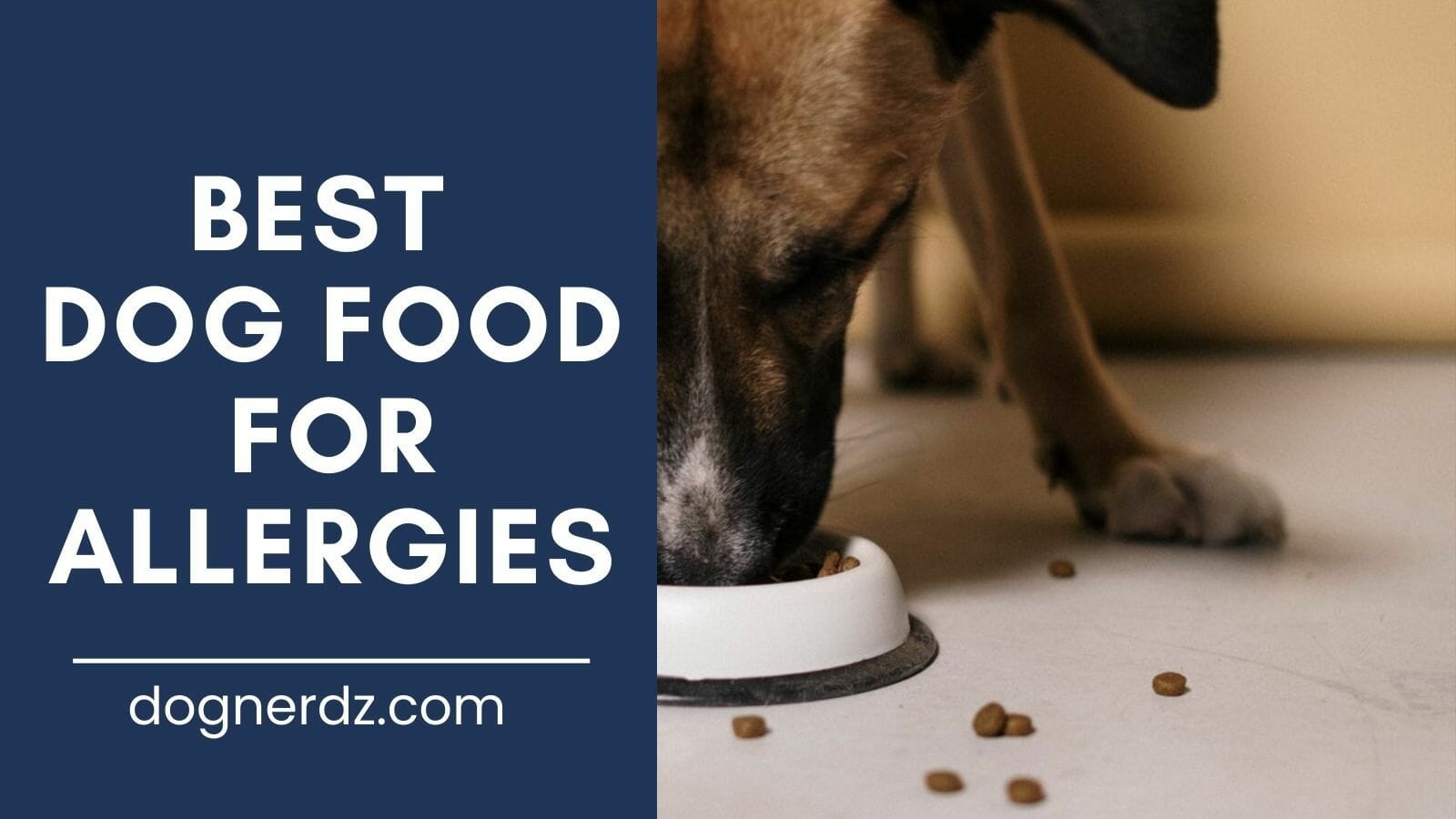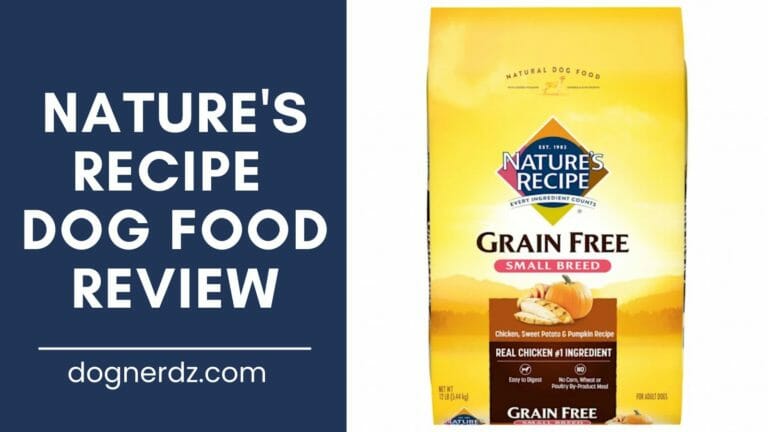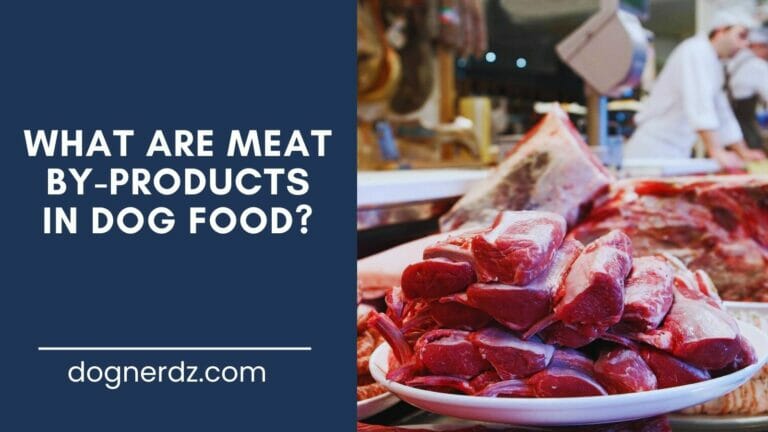Best Dog Food for Allergies in 2024
Table of Contents
Not all dogs are the same. There are hundreds of breeds, including purebred and crossbred dogs of all shapes and sizes that they each have different dietary needs.
Some dogs are born with allergies and require food that doesn’t upset their stomachs or harm them. Other dogs develop food allergies as they age and need their diet changed to something better suited for their needs.
If you have a dog with food allergies you may be in the market for a new brand of dog food for your beloved pet, or maybe you just want to learn more about the signs and symptoms of food allergies.
In this article, we are going to discuss food allergies and what to look for if you suspect that your dog is affected by them.
We will give our recommendations for the best dog food for allergies, answer some frequently asked questions, and discuss which ingredients to avoid.
Best Dog Food For Allergies Reviews
The best dog food for allergies is one that contains ingredients that don’t trigger an immune response from your dog. All dogs are different and will have different allergies and triggers.
These dog foods are the best for food allergies, though they may not be the best for your specific dog.
1. Best Overall: Hill’s Prescription Diet d/d Skin/Food Sensitivities Venison and Potatoes
Product Specifications:
Brand: Hill’s
Lifestage: Adult Dogs
Breed: All Breed Sizes
Food Form: Dry Dog Food
Special Diet: Sensitive Stomach and Skin
Our Review
Hill’s Prescription Diet d/d Skin/Food Sensitivities is the best dog food for allergies. This dog food is highly recommended by veterinarians around the United States and is known to be a reputable brand for all of your dog’s needs.
Hill’s dog food for allergies helps improve your dog’s skin allergies and contains natural ingredients. This dog food is free from soy protein, grain-free, and made with gluten-free ingredients.
Hill’s Prescription Diet d/d Skin/Food Sensitivities is good for all breeds of adult dogs. Hill’s dog food is headquartered in Topeka, Kansas. Hill’s sources its ingredients from all over the world and manufactures its food in the United States.
The Hill’s d/d Skin/Food Sensitivities dog food has multiple formulas such as venison and potatoes, duck and potatoes, and salmon and potatoes. This formula is also available in wet food as well.
Pros:
- Contains omega-6 and omega-3 fatty acids that help replenish the skin and coat.
- Gluten-free recipe.
- Great for All breeds.
Cons:
- Hill’s dog food has been recalled in the past due to excessive Vitamin D levels found in their food. You can learn more about the recalls here.
Guaranteed Analysis
| Crude Protein | 14% min |
| Crude Fat | 13% min |
| Crude Fiber | 3% max |
Why We Like It:
We love Hill’s Venison recipe for sensitive stomachs because many pet owners have said that it really works. No more itchy and red skin, no more shedding, and minimal gastrointestinal issues!
You can buy Hill’s Prescription Dog Food at any pet store such as Petco and PetSmart. If you need this item shipped to your home or want to learn more about it you can check it out on Chewy or Amazon.
2. Best on a Budget: Blue Buffalo Basics Skin and Stomach Care Duck & Potatoes
Product Specifications:
Brand: Blue Buffalo
Lifestage: Adult Dogs
Breed: All Breed Sizes
Food Form: Dry Dog Food
Special Diet: Skin and Stomach Care
Our Review
Blue Buffalo Basics Skin and Stomach Care dog food is a great choice for dogs with allergies. This special formula has a few flavor profiles to choose from depending on your pet’s specific needs.
Blue Buffalo Basics Skin and Stomach Care dog food comes in both dry dog food and wet food in multiple ingredient combinations. This formula is a limited ingredient pet food with a blend of antioxidants, vitamins, and minerals.
Blue Buffalo Basics Skin And Stomach Care dog food is best for adult dogs. They have special formulas for small and large-breed adult dogs as well. The Blue Buffalo pet food brand is headquartered in Wilton, Connecticut. Most of its products are manufactured in the United States except for a few products.
Blue Buffalo Basics Skin and Stomach Care dog food has multiple flavor formulas to choose from. It is a grain-free dog food that contains no soy, wheat, or corn. The main recipes use duck and potatoes, turkey and potatoes, lamb and potatoes, and salmon and potatoes.
Pros:
- Deboned Duck is listed as the first ingredient.
- This recipe doesn’t contain any chicken, beef, corn, wheat, soy, dairy, or eggs.
- This dog food is enhanced with vitamins and minerals.
Cons:
- There have been no recalls on Blue Buffalo Basics formulated dog food, but there have been some recalls on Blue Buffalo’s other formulas. You can learn more about the recalls here.
Guaranteed Analysis
| Crude Protein | 20% min |
| Crude Fat | 13% min |
| Crude Fiber | 6% max |
Why We Like It
We love that Blue Buffalo basics help with skin allergies such as itching, redness, and swelling.
You can buy Blue Buffalo Basics at any pet food store such as Petco and PetSmart. If you need this item shipped to your home or want to learn more about it you can check it out on Chewy or Amazon.
For a more thorough review of the product, read about the Blue Buffalo Dog Food Reviews.
3. Best Limited Ingredient Recipe: Acana Singles Limited Ingredient Dog Food
Product Specifications:
Brand: Acana
Lifestage: Adult Dogs
Breed: All Breed Sizes
Food Form: Dry Dog Food
Special Diet: Grain Free Limited Ingredient Diet
Our Review
Acana Singles Limited Ingredient Dog Food is a great choice for dogs with allergies. It provides your dog with complete nutrition for proper digestive health and immune support. Acana is a high-protein premium dog food with animals sourced from curated farms. This dog food contains no grains, gluten, peas, or chicken.
Check out some of the low protein dog food here.
Acana dog food is manufactured by Champion Petfoods which is a Canadian-based company. Acana claims all food is made in Kentucky and they source all of their ingredients from the USA.
Pros:
- Acana makes all of their pet food in their own kitchens, none of their ingredients are outsourced or pre-made which allows it to be the best dog food for allergies.
- Acana does not use GMO ingredients.
- Acana dog food has never had a recall according to the FDA.
Cons:
- Some owners have reported that their dogs won’t eat this recipe.
Guaranteed Analysis
| Crude Protein | 31% min |
| Crude Fat | 17% min |
| Crude Fiber | 5% max |
Why We Like It:
Acana Singles Limited Ingredient pet food has formulas containing duck and pear, lamb and apple, beef and pumpkin, and turkey and greens. Each recipe is guaranteed to be 60% protein sourced from high-quality meat and 40% carbohydrates from fresh vegetables.
You can buy Acana Singles Limited Ingredient pet food at any pet food store such as Petco and PetSmart. If you need this item shipped to your home or want to learn more about it you can check it out on Chewy or Amazon.
Related: Best Grain Free Puppy Food
Dog Food for Dogs with Allergies Buyer’s Guide
What to Look for if Your Dog Has Allergies

If you find that your dog has allergies to specific foods, you must feed them differently than before. You never want to continue allowing your dog to eat foods that trigger allergic reactions.
Limited Ingredient Dog Foods

Limited ingredient dog foods are the best dog food for allergies. A limited ingredient pet food combines only a few ingredients such as sweet potatoes and beef with no artificial flavors or colors. This means there is less chance there are ingredients that your dog could be allergic to, simply because there are not much different food sources included.
Limited ingredient diets are great for dogs at all life stages and promote healthy skin and support your dog’s immune system. Limited ingredient diets not only help keep your dog healthy but they also are minimally processed which makes them more nutritious.
Limited ingredient dog foods come packaged as dry food and wet food. Some brands are frozen or refrigerated which helps them stay fresh with limited preservatives which is great for your dog’s immune system.
You can also make limited ingredient foods for your dog at home. As pet owners sometimes we want to be hands-on and prepare what our dogs eat ourselves.
Hypoallergenic Dog Food

Hypoallergenic dog foods are made with a novel protein and one carbohydrate. A novel protein is derived from a lesser-used animal that is less likely to trigger an immune response.
These dog foods have a simple set of ingredients that help with your dog’s allergies. Hypoallergenic dog foods are usually a grain-free formula that is easier on your dog’s digestive system.
Hypoallergenic dog foods can be beneficial once you know what your dog is allergic to, for example, if your dog has skin allergies when they eat chicken, hypoallergenic dog food made with rabbit may be the best choice.
What Ingredients to Avoid
As pet owners, we want to give our dogs food with balanced nutrition that supports a healthy immune system. Part of understanding what is best for our dog’s diet is knowing which ingredients are most likely to cause allergic reactions.
Adverse food reactions can happen with almost any ingredients, but the following dog food ingredients have the highest likelihood of causing skin allergies and allergic reactions.
Grain

Grains are a very common culprit when learning about what causes allergic reactions in dogs. Grains are a widely used ingredient in many brands of dog food. Examples of grains used in these brands are brown rice, corn, oats, wheat, and barley.
Grain-free dog foods eliminate these ingredients and are a better dog food for your dog’s allergies. A grain-free dog food helps heal itchy skin and improves coat health.
Dairy

Dairy is another common allergen found in dog foods. Dairy is an animal protein that causes itchy skin and rashes in dogs. Dairy is added to dog food in the form of milk, cheese, whey, yogurt, and colostrum.
Limited ingredient dog food for allergies can help eliminate these added ingredients and help give your dog complete and balanced nutrition.
Eggs

Eggs are an animal protein that can be found in many dog food brands. Eggs are often added to dog food in the form of whole eggs, egg whites, egg yolks, or egg products. Eggs can be from chickens, quail, turkeys, or ducks.
While eggs do contain many amino acids and can promote healthy skin, they can still produce an immune response causing an allergic reaction. If you think your dog is allergic to eggs try an elimination diet to test your theory.
Soy

Soy is a type of legume that is grown all over the world, this bean is very common because it is cheap. Soy is an ingredient that is often added to dog food in the form of soybean meal, soy, soy flour, artificial flavors, and vegetable broth.
If your dog food has the general term natural ingredients listed on the label, beware. Since soy is a bean it is considered natural and can be listed under this category.
Beef
Beef is a type of animal protein that comes from cows. Beef is often the first listed ingredient on premium pet food brands and is labeled as ground beef, beef liver, Angus beef, or beef meal.
Beef is considered a premium product, but if your dog is allergic to it, then this quality does not matter. Consider an alternative to beef such as bison, lamb, or goat.
Chicken
Chicken is an animal protein that is often added to dog food. Many pet food brands add chicken to their dog foods in the form of deboned chicken, chicken fat, chicken meal, and chicken by-product.
Chicken is one of the most common animal protein sources used in dog food. If your dog is allergic to chicken then you can try an alternative formula that uses beef or lamb.
Other Possible Allergens
Any listed ingredient can be a possible allergen for your beloved pets. Dogs can develop allergies at any of their life stages. Animal proteins have the highest likelihood of triggering an immune system response that causes an allergic reaction.
Fish is an animal protein that can trigger allergies in dogs. Fish is often listed as fish meal, salmon meal, tuna, menhaden fish meal, and fish oil. Fish meals such as salmon meals and menhaden fish meals are the most common types of fish additives in dog food.
Frequently Asked Questions
Below are the most common questions that pet parents have about dogs and food allergies.
Food Allergies vs Sensitive Stomach
Many people use the terms food allergies and food sensitivities interchangeably. But, there is a difference between the two terms. Food allergies are typically more severe and food sensitivities can cause minor to moderate complications.
Food allergies are created by a response given by the immune system. When the immune system is triggered by the allergen it creates antibodies. The antibodies are then fought off by the immune system causing the allergic reaction.
Allergic reactions can be minor, such as skin allergies with itchy skin and rashes. Allergic reactions can also be severe, such as anaphylaxis which can cause death. Signs of anaphylactic shock in dogs can range from itchiness, wheezing, hives, diarrhea, vomiting, and swelling of the face, ears, lips, and eyes.
Always get medical treatment as soon as possible if you think your dog is going into anaphylactic shock. Death can occur in a very short amount of time if this type of allergic reaction is not treated by a medical professional.
Food sensitivities are typically less likely to cause permanent harm, but they can still produce symptoms that you should be aware of. Food sensitivities are experienced when the food reaches the digestive system and gastrointestinal upset occurs.
If your dog has a sensitive stomach it may experience food sensitivity. Sensitivity is typically caused by adversity to certain chemicals in the food. Small amounts of the ingredient in question may not trigger any response, but the more your dog consumes the higher likelihood of symptoms occurring.
Symptoms of a sensitive stomach are bloating, gastrointestinal discomfort, excess gas, diarrhea, vomiting, fatigue, and irritability. These symptoms may take a few hours to notice lasting for hours or up to a few days.
As you can see some of the symptoms of a food allergy are similar to the symptoms of a sensitive stomach, if you are unsure if your dog is having an allergic reaction or just gastrointestinal upset contact your veterinarian for immediate assistance.
Food Allergies vs Food Intolerance
Food intolerance is similar to a sensitive stomach but completely different than a food allergy. As we learned above, an allergic reaction to food is caused by an immune system response and can be minor or life-threatening.
Food intolerance is caused when your dog lacks the proper enzymes to break down the food to properly digest it. This lack of digestion creates gastrointestinal discomfort similar to when the dog has a sensitive stomach.
Signs of food intolerance are bloating, gassiness, diarrhea, vomiting, and abdominal discomfort. Contact your vet if you notice any signs or symptoms and have them advise you on what to do next.
What Are the Symptoms of Food Allergies?
If you suspect that your dog has a food allergy monitor them during and after they eat. Not all food allergies are the same and each dog will show symptoms differently. Some may show symptoms right away while others may take more time.
Physical signs of food allergies in dogs are vomiting, diarrhea, and itchy skin. You may also notice weight loss, fatigue, irritation, or hyperactivity. Always be aware of mood changes and physical changes in your pet.
Can My Dog Die From Food Allergies?
Yes. While it is uncommon for dogs to die from a food allergy if the allergy is serious enough it is possible for death to occur.
Death from allergies occurs when your dog goes into anaphylactic shock. Anaphylactic shock is when your airways close due to a flood of chemicals reacting to a stimulus from the ingredients that your dog is allergic to.
How Long Do Food Allergy Symptoms Last?
All dogs are different, especially when it comes to allergies and allergic reactions. Each dog has a unique immune system that reacts differently when stimulated. The onset of allergies can be sudden or gradual depending on your dog.
Symptoms of an allergic reaction may last a few hours, days, or weeks depending on the severity of the reaction. Skin allergies can last a few months until fully healed.
Can I Give My Dog Medication For Food Allergies?
Yes. If your dog has symptoms of an allergic reaction to their food your veterinarian can prescribe medication to help ease their symptoms until you can figure out the cause.
Medications such as Benadryl and antihistamines can be administered with the approval of your veterinarian.
Can A Dog Suddenly Develop Food Allergies?
Yes! Even if your pet’s diet has been the same for years, they can still develop food allergies suddenly. Always be keen on new symptoms and be sure to monitor your dog if you suspect any type of allergy.
If you are unsure whether or not your dog has food allergies, it may be best to reach out to your veterinarian for advice.
How Can I Test Which Ingredients My Dog is Allergic to?
The elimination diet is a way of eating that helps diagnose if and what your dog may be allergic to. To begin the elimination diet you must change your dog’s diet from what they are used to and switch to a limited ingredient diet.
Limited ingredient diets are only a few ingredients that consist of natural ingredients. For the elimination diet to work, you must give your dog new food they have never eaten before. For example, if your dog has eaten chicken and brown rice dog food their whole life, try a lamb and sweet potatoes recipe or beef and barley.
You must continue with these two ingredients at meal time for 12 weeks. No other food or treats can be given to your pet. Any interference with this way of eating can trigger an allergy and mess up the experiment.
At the end of the 12 weeks, you will talk with your veterinarian or create a list answering the question of whether or not your dog’s symptoms have gone away completely, lessened, or continued.
If your dog’s allergies have continued it is possible they are allergic to one of the ingredients from their new diet. If the dog’s allergies have gone away it is probably safe to assume that these two ingredients are safe.
Continue the following 12 weeks with a new set of ingredients and monitor how your dog’s allergy symptoms appear. Eventually, you will be able to rule out the bad ingredients and continue with the good ones.
The elimination diet can be a lot of work, many people opt to make their own two-ingredient dog food combinations because they can easily monitor what their pet is consuming.
Can I Make My Own Dog Food
Many dog owners are wanted to skip past buying dog foods that may or may not be causing allergies and resort to making their own recipes at home. While the answer to this question is, yes, you can make your own dog food, you must understand the process and importance of getting it right.
If you make your own dog food you need to make sure that your dog is getting a balanced blend of vitamins and nutrients and the proper amount of amino acids and fats.
Always discuss homemade diets with your vet to assure yourself that you are providing your dog with adequate nutrition.
When to Consult With Your Vet
While trial and error is always an option when trying to navigate figuring out your dog’s allergies, we highly advise speaking with your dog’s veterinarian. Your veterinarian knows your pet’s medical history and they are trained, medical professionals.
Allergies are serious medical conditions that can sometimes be deadly if not treated with precise caution and care. We never want your dog to suffer or die due to inadequate feeding.
Conclusion
As a pet parent, I understand how important it is to do everything I can to be sure that my dogs are properly taken care of. Pet allergies can be a concerning matter that we must get to the bottom of to ensure that our dogs live their best lives.
I hope this article has shown you the importance of doing the right thing for your dog if they have food allergies. Always be sure to talk with your veterinarian as soon as possible if you suspect that your dog’s food is triggering an immune system response to find the best dog food for your dog.
Expert Tip
If you suspect that your dog has allergies the best thing to do is talk with your veterinarian. This first step will help you create a plan of action that will help your dog and give you more peace of mind.
Your veterinarian will give you food recommendations and may administer an allergy test to see which ingredients are causing the problem with your furry friend. If you are unable to involve your veterinarian there are some suggestions that may help.
Did You Know?
Dog food allergies can develop over time or your pup could be born with them. Food allergies are one of the most common types of allergies that your dog may develop. The best thing for your dog with food allergies is to educate yourself on how to properly care for them and understand what food allergies are.
Food allergies occur when your dog’s immune system starts producing too many antibodies. These antibodies attack parts of the food, such as carbohydrates like corn or wheat, or proteins like beef or chicken.
Even if your dog has eaten the same food for years, their immune system can begin creating antibodies against an ingredient in their food and an allergic reaction can occur.










